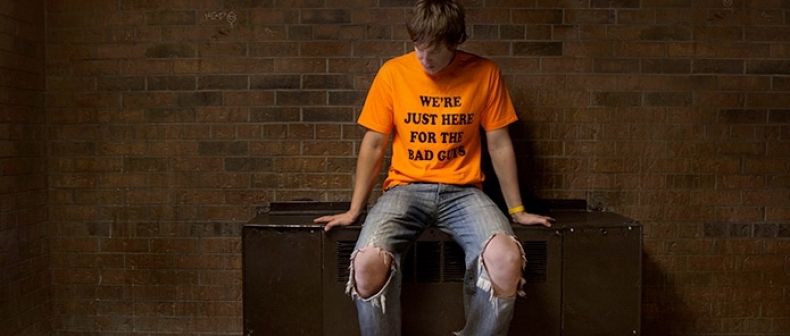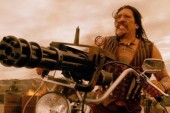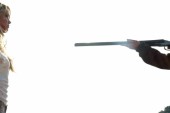
After wrapping Nirvana The Band: The Show, the hilarious web series he co-created with Jay McCarrol, Matt Johnson turned his attention to a task seemingly more foolish than naming your rock band after a famous rock band. He wanted to make a comedy about school shootings.
On paper, The Dirties tells the story of a wise-cracking young man whose obsession with movies pushes him to stage a real-life revenge killing of the bullies who torment him and his friend. The audience is invited to laugh along with the tortured nerd as he gleefully plots his brazen school shooting.
Of course, The Dirties is far more complex than that shocking pitch suggests. Johnson has crafted a compelling portrait of two young men, vicitimized by high school bullies, and the measures they take to cope and respond. There are plenty of laughs, but the humour only underscores what society at large perhaps chooses to ignore about this type of violence.
Johnson’s take on school shootings is turning heads. Presented as found footage, the film offers what the Huffington Post calls “the most empathetic and human portrait of bullying, and its deadly consequences, ever put to film.” Kevin Smith is championing the film through his Kevin Smith Movie Club, calling it “the most important film you will see all year.” It took home the award for Best Narrative Feature at the 2013 Slamdance Film Festival. The film hits screens this Friday October 4.
We spoke to Johnson about realism, challenging audiences, and screening the film the day after Sandy Hook.
As someone who grew up in Toronto and went to a Toronto high school, the setting affected me because it felt familiar.
We wanted to make it so that all of the school stuff especially the exterior stuff was all very resonant to what the people who made the film had grown up with. So there’s one school that we used the interior of — that’s where we actually were in a high school as students — that was in Peterborough, but all the other schools are Toronto schools.
Jared Raab, one of the producers and the cinematographer, is from Peterborough and he was able to get us into this really amazing school where (co-star) Owen (Williams) and I enroll as students more or less. A lot of the stuff you see of Owen and I interacting with real kids, where you think they must be real kids, it’s because they think we’re real students in the school.
There’s the one scene towards the end where you guys are having an argument in the hallway…
And the kid comes up and looks right at us.
Yeah! That’s something that would happen in high school. People would be weird.
I know. That guy’s a jerk. I thought that was so funny, but that kind of thing was happening to us constantly when we were shooting in the school, because everyone just thought we were students. So they treated us as though we were kids that nobody knew, which is quite alienating.
That’s parallelled in the scene where you’re measuring the school with a measuring tape and the characters are arguing, “Does this look weird?” “Nobody knows what we’re doing!” and you realize the anonymity you can have in a place where you’re supposed to be so familiar with everybody.
It comes from the base theme of the film, which is alienation, being put in a box, and I think Matt is very open in expressing that nobody pays attention to them. Nobody cares what they’re doing. So when he’s constantly bringing up this point that no one’s paying attention, in that scene specifically, nobody’s going to think we’re doing anything bad, It’s because in the film you never see anyone notice them. Ever.
I ask about the Toronto setting only because I noticed at TIFF this year that there were a ton of movies that were openly set in Toronto, a sort of micro-trend. Is that something you even thought about? You didn’t make it overt, but anyone who is familiar with the city would recognize it.
That goes back to the mind-set of how we were shooting Nirvana the Band. We live in Toronto, so we weren’t trying to hide it in anyway. But in terms of it being Toronto-centric, Nirvana the Band was extremely Toronto-centric, I think we were open about being young people in Toronto. Whereas this I think is less so, because the kids are too young to really have a civic identity, if that makes any sense. As a sixteen-, seventeen-year-old kid your high school is your city. So I don’t think they were thinking, “We’re from Toronto, Canada.” At least when I was that age I didn’t have those thoughts. Because it didn’t resonate with the characters, it didn’t make sense addressing it in the film. But, everywhere we shot was in Toronto, other than the stuff in Thunder Bay, which is pretty open, we talk about it being Thunder Bay.
That’s the scene where you go up to the cottage and shoot the guns. I wanted to ask you about that. It feels so silly to ask because it’s obviously a movie, but I realized the question came to my head: were those real guns? Something about the way it was shot made it feel like the danger was real. When Matt says, “Oh, shoot one passed my head!” it felt like something could go wrong.
That scene was intended to have this feeling of kids not respecting dangerous weapons. The character of Matt is so wild and optimistic, always thinking nothing will go wrong, and that whatever he’s saying is right. We wanted to show him playing with these guns the same way he plays with all these other things to sort of shock the audience. That effect was very much intended, trying to make it seem as dangerous as possible while still being somehow funny. We fought hard to get that effect, making these guns seem as insanely real as we possibly could, so when you see those scenes at the end you feel like everything is completely real. The movie is supposed to feel like a big mistake: a bunch of kids put cameras on and you’re watching what they shot, and it hasn’t be tampered with at all.
Owen Williams, left, and Matt Johnson in a scene from The DirtiesThere’s a thread that runs through Nirvana The Band The Show and The Dirties, this idea of pursuing delusional dreams, or living in your own fantasy world. Matt has these, not necessarily arbitrary but these very specific ideas of what a success or failure looks like. He creates this fantasy and he goes after it, and the same thing happens in Nirvana the Band. Is that a theme that you’re interested in?
A friend of mine once put it really well, this is back when we were in the middle of making Nirvana the Band. He said, “This character says this impossible thing will work, and he convinces all his friends that it will work, and then when it doesn’t work, he says that it did work.” No matter what, this character never fails. Even failure is success, and that’s very close to what my youth was like: being so arrogant and having such a vulnerable ego that to admit defeat, or even to admit that you had done something wrong, that something didn’t work out as you had intended it, would be so humiliating and shameful that it was way easier to just lie. You lie to yourself and everybody else, so they’re like, “Well, maybe, I guess it did. This is what you wanted to have happen.” So that’s certainly a strong theme in my own life. Having these characters who try to get credibility or seem powerful by proclaiming the impossible and then doing everything in your power to make that promise reality, when you know from the outset that that promise can never be kept.
Do find that in your real life — you’re now a successful filmmaker, you’ve got Kevin Smith on board, you’re winning prizes at Slamdance — is that in your own way your own kind of delusional dream that you’ve achieved?
No, no, no. This is all still very much in that theme. It’s been like a total failure and I’ve just been able to pass it off as a success. The new film that we’re making is very much in the same way. It’s always a struggle. It’s always incredibly difficult. I always over-promise. At least at the beginning, I’ll over-promise what a film will be, and then artistically the challenge is to try to beat that. I think that’s what happened with The Dirties, and I think that’s definitely what happened with Nirvana the Band. So while it may be true that these things are gaining traction now, I haven’t changed at all. I’m still thinking, “Oh, I’ve got to convince these people that it’ll be good.” And then I’ve got to figure out a way to make it good. There’s an amazing quote that I think applies to this and all the things that we do: “sometimes you just have to jump off the building and build your wings on the way down.”
How much of the story in The Dirties comes from your own experience as a young person dealing with bullying. Was that an experience you dealt with?
We tried to make everything in the film be something that had either happened to Owen, myself or the other writers Josh and Evan, or something that we’d seen. None of the bullying that happened in the film one of us didn’t experience or see first hand or wasn’t involved in. In that sense, yes. I think my high school experience, in terms of how Matt behaves, was one hundred percent identical to the character. The things that happen to these characters are not indicative of what my life was like, but the characters and their friendship, just the way they interact with one another. But I can’t take credit for everything that happened in the film because it was very much a shared creative effort between me and the other writers. Some were things that happened to me some were things that happened to other writers and some were things that we had all collectively seen or experienced.
And then what about when you’re making a film like this, and I wouldn’t say it makes light of school shootings, but it’s dealing with it in a comical way, what happens–
Well, people can definitely see it that way. I think that was one of our biggest challenges. This movie is often billed as, or talked about in shorthand, as a school shooting comedy, or like a really hilarious school shooting movie, which of course is problematic on paper without seeing the film, because it seems so insensitive and tasteless and quite awful, It would be evidence of a really immature perspective on school violence to present something like that. But, I think that’s a part of our trick. That’s something that I really, really like and that’s posing questions to audiences before they sit down and see films. “Doesn’t it seem like the worst idea in the world?” Like, Nirvana the Band, the pitch of it is so stupid and so unwatchable and not something you would ever think of doing, in the same way that a comedy about a school shooting, just as a broad sense, it’s awful and tasteless.
We try to sort of have these quick log-lines that make the film seem inaccessible, and we try to challenge that by showing you something really sincere and I think really delicate that’s quite respectful of what’s going on. To try to then trade on that initial expectation, which I think is fun. It’s kind of like a prank, in a way. To get audiences to think you’re really stupid and then when their guard is down you show them something that they weren’t expecting.
What about your own feeling when you’re in the midst of production and you see something like Sandy Hook on the news? How did that affect you?
The Sandy Hook killing actually happened the day before we were doing our first screening for friends and family in Toronto. The first time we were going to show it to the cast and crew who made the film, it was like the day or two days afterwards. So it was a huge shock and it certainly turned up all these questions like “Well can we show this film? Do we need to wait? How are people going to ingest this now that sort of the media landscape has changed?” It kind of gets back to the reason that we made this film in the first place, and that’s that I don’t agree and I don’t think the filmmakers agree with this idea that there’s nothing that can be done about school violence, specifically school shootings.
The reason that we were interested in making this movie is we thought the news was doing such a terrible job of talking about this issue. So often, we only hear the most evil, alienating version of the people who commit these things, and never once are people talking about the root causes or what these people’s lives were like before. There’s just absolutely no humanity in how people who do terrible things are approached. So it really was just more encouraging to get this film out and get people talking about it, that it could lead to a greater understanding of this type of violence and this mortal danger that we’re all in where young people, especially young men, feel like they need to lash out to be important or to be powerful or to have a voice. More than anything that’s what we’re trying to address. So I mean, we think the movie is coming out at just the right time.
How did people respond when you showed the film just after Sandy Hook?
That screening was interesting because those people were family and friends of ours, there were about 200 of them and because nobody had seen the film and nobody was talking about the film, that was the only audience. So there were a lot of questions and issues we were talking about and because we knew everybody it was quite positive. The first screening we were worried about was at Park City at Slamdance, which was our first public screening. We were just horrified that people were going to think we were these idiot Canadians, that we were trading on this political issue, that we had just made the movie that week to seem like we were topical. But that was probably the best screening we ever had. It was a lot of young people, people involved in filmmaking, and people went crazy, just because I think this is the type of movie that you don’t normally see. You don’t get this perspective on issues like this. So I think people were really excited about it.
So far, no bad experiences. We’ve been to so many film festivals now and the most critical anyone has ever been is asking what my reaction will be when somebody goes and kills people in their school wearing a Dirties t-shirt and does an exact copycat slaying. And that’s a relevant question and I think worth talking about, but in many ways it gets at the central issue of what this film is trying to say, which is that young people are not Manchurian Candidates just waiting for some media influence to turn them insane. I think this film is really trying to challenge that and if your worldview is such that you think one movie or one piece of art or one song getting out to the popular conscience is going to change a bunch of people for the worse, then I think you’re ignoring what is really going on which is a mental health issue.
The Dirties is screening nightly October 4 – 10 at TIFF Bell Lightbox.
____
Michael Kolberg is The Sprawl Editor at Toronto Standard. Follow him on Twitter for jokes @mikeykolberg.
For more, follow us on Twitter at @torontostandard and subscribe to our Newsletter.














